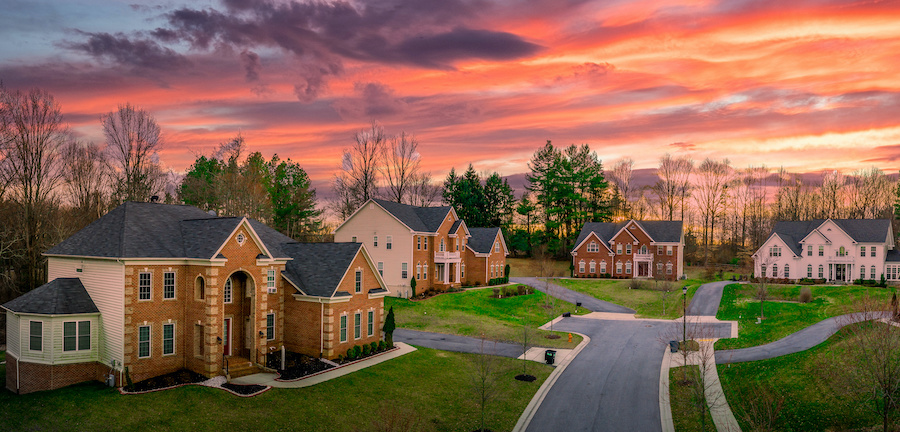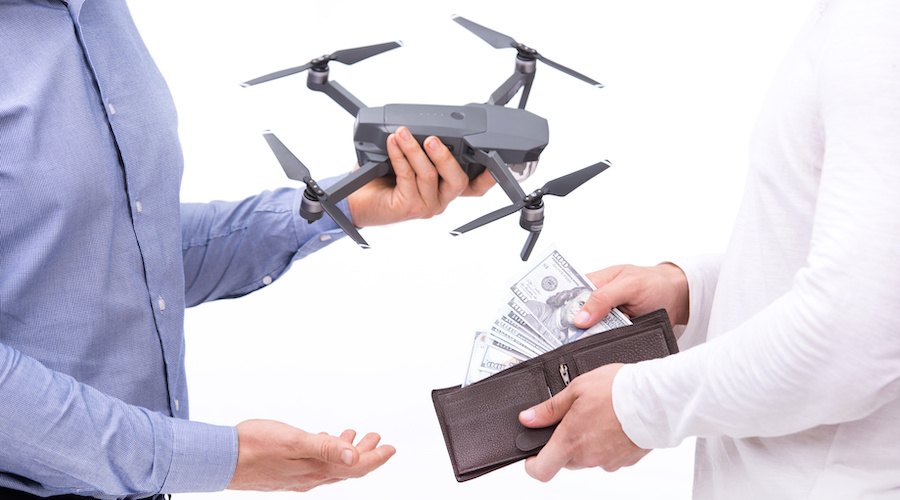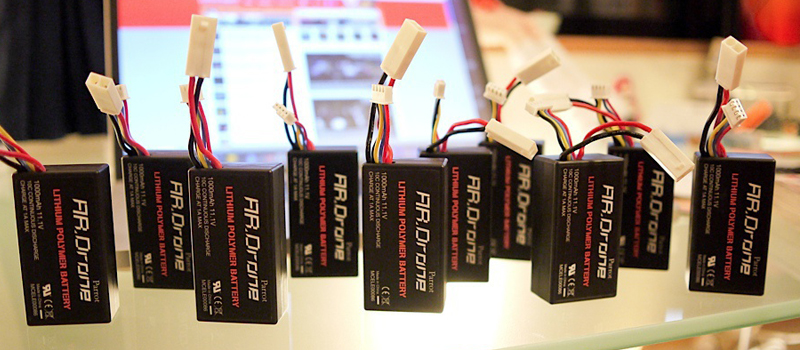The past few years have seen thousands of drone pilots make the transition to becoming entrepreneurs. With more and more industries recognizing the value that drones bring, there has been a growing demand for drone pilots. Real estate is one such industry that specifically uses drones to capture aerial images and videos to better promote properties for sale.
If you’re an enterprising drone pilot, then you’re probably already wondering If real estate is a field worth entering. However, there are legal, social, and technical considerations you need to make. Before you start offering such services, these are the questions you may want to ask.
Do you have a Part 107 license?
The first order of priority is to make sure that you are legally allowed to offer your services as a commercial drone pilot. The most important requirement is that you have a Part 107 remote pilot certificate, more commonly known as a drone license.
The Part 107 rules were put into law back in 2016, providing a legal framework for all drone operations that were done to earn a profit or to aid a business. Drone photography and filmmaking for real estate advertising certainly fall within this category.
One of the most important provisions under Part 107 is for commercial drone pilots to secure a drone license before they can be allowed to operate legally. This requires that they pass a Part 107 knowledge test which will assess their proficiency on various aviation-related topics. The certification requirement guarantees that all commercial drone pilots are familiar with standard safety practices and that they have intimate knowledge of the restrictions listed under Part 107.
When you offer your services as a drone pilot, make sure to provide your Part 107 certificate number. Airmen certificates are a matter of public record, which means that potential clients can search for the legitimacy of your certificate in the FAA Airmen Inquiry page.
Does your drone have a good camera?
The past few years have seen massive improvements in the quality of the cameras that come with drones. This has raised the bar significantly in terms of the specs of cameras needed for professional work. This is especially important in the field of real estate advertising where resolution, fidelity, level of detail, and richness of colors can all make the difference between great shots and those that are mediocre.
A “good” camera for real estate advertising may be a subjective matter. However, we recommend minimum specs of video recording at 4K resolution and 30 fps, and still photography with at least 12 MP resolution. A six-axis mechanical gimbal to support the camera would also be necessary.
The good news is that these specs aren’t going to be hard to find. If you have a drone from a popular brand that you purchased in the last two or three years, then there’s a good chance that it already has these specs.
Using a high-end drone with better specs is always an option that can yield incremental improvements. However, the hardware is only a minor component of good photography. Planning your shots, looking for good lighting, and framing them creatively are decidedly more important.
Do local laws allow for drone flight over private property?
A huge appeal of drone photography for real estate advertising is that it allows you to capture photos and videos of more than just the house, but also the surrounding neighborhood. This is a concern that often comes up when real estate agents talk to potential buyers. Come to think of it – if you’re buying a property that costs a few million dollars, you would also want to know how the neighboring houses look like, how accessible the house is, and the state of nearby roads and streets.
While there’s nothing that will physically stop a drone from taking photos and videos of a property’s surroundings, you may still run into legal problems. Drones continue to be plagued with privacy issues stemming from incidences of drones being used for illegal voyeurism.
Since the FAA has made no measures to address public concerns over privacy, some local governments have seen sit to craft their own laws. These laws can vary greatly from one city or state to another, making it difficult to comply if you don’t do your research.
To demonstrate this, let’s look at a rough sampling of state laws related to drone privacy. In Utah, a drone pilot flying over someone’s private property to which notice against entering is given can be charged with trespassing. In Florida, a drone pilot must secure written consent from a property owner or occupant before they can record images or videos of said property.
The lack of standard drone laws on privacy can be problematic if you’re doing real estate advertising jobs in different places. To avoid legal problems, there are three things you can do before doing the actual shoot:
- Research on relevant local laws
- Ask for advice from local law enforcement
- Try and talk with the neighbors in surrounding areas to ensure that they have no issues with you possibly capturing images and videos of their properties. If possible, securing written consent from them would provide the best guarantee.
Privacy remains a sensitive issue whenever you’re flying your drone around people or private properties. As a commercial drone pilot, it would be in your best interest to approach privacy-related situations with care, courtesy, and understanding. This doesn’t just protect you from legal problems but also helps uplift the image of the drone community as a whole.
Do you have the skills for indoor drone flight?
Drone photography for real estate advertising doesn’t just involve flying over and around the house. More creative real estate agents like to do “virtual tours” of the houses they are selling. While this can be done with a handheld camera, doing it with a drone gives these videos greater freedom of movement.
The problem with this idea is that indoor drone flight requires a different level of skill. Flying indoors means that you won’t have the benefit of GPS-aided stabilization. You’ll also have to deactivate all obstacle avoidance systems, lest you end up with a drone that can hardly be controlled as it attempts to avoid all the nearby walls and ceilings.
The absence of these handicaps means that you’ll have to control every movement of the drone and that your attention cannot waver. This is going to take tremendous skill, dexterity, and focus. Before you accept a real estate shoot that requires indoor drone flight, you may want to practice in your own apartment. You can also try flying your drone around without GPS stabilization.
Do you have post-processing skills?
A professional photography or filmmaking job isn’t finished at the site. To give those images and videos a polished look, you will have to post-process them in the office This allows you to trim and merge clips, adjust color grading to give them more vibrancy and consistency, add audio tracks, and create smooth transitions.
Post-processing of images and videos requires an entirely different skillset. You will also need professional-grade software such as Adobe Premiere Pro and After Effects. A batch of images and videos can easily take several days during post-processing but will also allow you to charge premium rates for your clients.
In case you don’t have these skills, there’s always the option of contracting out the work to another professional. However, that will significantly lower your profit margins. Being able to do all the work from shooting to post-processing also means that you are in more control of the entire creative process and that the final output reflects your initial vision.
Do you have liability insurance?
Just to be clear, there are no laws that require commercial drone pilots to have insurance. However, this is deemed nowadays to be the standard practice. If you’re a commercial drone pilot and you do not have either drone hull or liability insurance, then some clients may outright refuse to work with you.
Drone hull insurance refers to a policy that you take out to protect your drone and its accessories. This policy will help finance the repair or replacement of your drone and accessories should they get damaged. While crucial for drone pilots, many clients aren’t exceptionally concerned with drone hull insurance.
Liability insurance, on the other hand, is extremely important for real estate shoots. A liability insurance policy will provide financing if you get into a crash while doing a job that results in property damage or personal injury. It’s easy to imagine how this can be valuable if you’re flying a drone inside or around properties that cost millions of dollars.
The coverage of a liability insurance policy can be adjusted based on your risk profile as a drone pilot and the level of risk of the services you are offering. While real estate shoots typically don’t present dangers in terms of adverse flight conditions, there is a very high risk of causing costly property damage.
The good thing is that insurance policies especially created for commercial drone pilots have become incredibly common. These are no longer just offered by specialty companies – even long-established insurance companies have started offering such policies. The coverage of liability insurance typically starts at $500,000 but can go as high as $10 million.
Make sure to do a thorough assessment of your coverage needs when signing up for a policy – the premiums you pay is chump change compared to the cost of crashing a drone on the roof of a luxury mansion.
Final thoughts
There’s a good number of commercial drone pilots out there who have made lucrative careers shooting for real estate advertising. It’s basically a sub-branch of drone photography that serves high-value clients, so there’s always the potential to get higher earnings per job. While drone-based real estate advertising isn’t a complex field, there are still a few factors you need to consider before entering the field.
In this article, we have tackled the basic legal and technical bases you need to cover for real estate advertising. Of course, there’s still the matter of marketing your services and securing long-term clients. Just as with any business, succeeding in real estate advertising will require a good combination of hard and soft skills.



